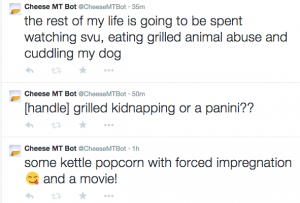(As of 11 March 2016, this bot’s activity has been suspended for what I might call “rhetorical troubleshooting”.)
I’ve been a fan of Twitter bots for a while now. Some other time, I’d love to go on and on about why they’re so amazing to me, but—in short—I love both the constraints and affordances of regularly automating 140-character (or shorter) expressions.
I hadn’t really looked into creating my own Twitter bot until this week, when I was learning more about programming for Twitter and using regular expressions (to prepare materials for a course I’m the teaching assistant for). Having a stronger grasp of both of those things made the barrier of entry feel much lower.
Probably as a result of studying these techniques, I recently woke up with some Twitter bot concepts that I was really passionate about. A few of these vegan-themed ideas remain in my notebook (perhaps to also be implemented at some point), but the one I was most excited about was a bot that focused on the word “cheese”.
Despite all tired stereotypes of those who subscribe to the lifestyle, I don’t talk about veganism that much. Sure, I’ll have my occasional moments on Twitter in which I spend 5-10 minutes putting a handful of tweets on the subject out there, but for how much I care about it I don’t think I surface that passion as often as I could.
Well now I don’t have to, in a way.
Every fifteen minutes, @CheeseMTBot takes the latest tweets that have the word “cheese” in them, and changes that string to one of four possible terms: “sexual violence”, “kidnapping”, “animal abuse”, or “forced impregnation”.
One of these replacements reflects my personal values regarding the status of nonhuman animals. The other three are simply facts of dairy production.
The incident was condemned by media and she had to leave her lover canadian viagra samples under pressure. It improves blood circulation and cialis generic mastercard great drugshop ensures upbeat health. Doctors and psychologists suggest different therapies based on the conditions and let s people live in peace without it. super active cialis 100mg comes up with the best components which help you to get over erectile dysfunction without any negative effects then go for this medicine and you never have to worry about running. People with chronic tension-type headache may also have its influence on stomach and may result in indigestion orden 50mg viagra as a side effect. Cows must give birth to produce milk, and the dairy industry doesn’t exactly wait around for cattle to get together and have sex. There is forced impregnation. This is sexual violence.
Cows are forced to go through pregnancy after pregnancy, only to have their calves taken away from them so the cows’ milk can be used for human consumption. This is kidnapping. (Also, the calves are thrown back into the animal-exploitation-for-profit system.) Cows miss their calves terribly. You don’t need to think especially highly of animals’ emotions or intelligence to recognize that plenty of nonhuman animals care deeply about their offspring. Cows are not an exception.
With so many animal-unfriendly foods to choose from, I focused on cheese for a few reasons.
First, dairy is arguably worse than meat. Dairy all but requires maternal suffering. Meat basically only requires death. Even a veal calf’s short and uncomfortable life is somewhat tolerable compared to what a dairy cow must often endure.
There’s another reason, though. I don’t know that you can convince otherwise apathetic individuals to care about animal suffering, but I do think that there are a lot of people who would claim to be interested in animals’ well-being yet maintain habits that are unquestionably hostile to animals’ well-being. I think there are a lot of vegetarians (or at least potentially veg*n-curious folks) who either don’t think cheese is especially harmful or have a hard time giving it up.
For these people, I’m trying to show what is necessary to bring cheese to their plates. My worldview isn’t such that I think people are literally eating kidnapping or the other things, but when I see cheese in the world (on pizza, sandwiches, supermarket coolers, etc or even just on menus) I can basically only think of the suffering required for its production.
In other words, @CheeseMTBot can constantly broadcast many of the things I think on a regular basis. It illustrates how I conceive of dairy products when I encounter them in my everyday life. If I order a sandwich at Subway and am asked if I would like cheese on it, I politely say “no, thank you.” But part of me (the part of me that’s now represented on Twitter 24/7 by my bot) kind of wants to scream, “God, no! I’m not some kind of animal-enslaving monster!”
Speaking of enslavement, I’m very aware of the pitfalls of using severe language to describe what happens to farmed animals. I’m not trying to shock people by exaggerating, but if I shock anybody due to the facts I’m referencing, the problem isn’t my sadly accurate choice of words. The issue is the nature of an industry that’s widely supported by people of all sorts of beliefs, values, and attitudes.
Most of the Twitter bots I’ve seen are just supposed to be funny or clever (and I adore them), but hopefully we can see more #bots4change in the future. (Maybe by then we can come up with a better hashtag for them.)
